

New, and Improved ACT Prep Lesson Plans. Kaplanact & testive. ACT Science Reasoning: Strategy Video - Lesson and Example. Science Strategy To understand how to approach the ACT Science test, first you have to understand what makes the test hard.
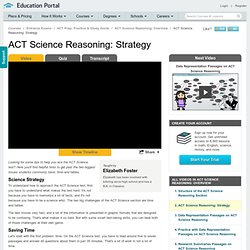
It's not because you have to memorize a lot of facts, and it's not because you have to be a science whiz. The two big challenges of the ACT Science section are time and tables. The test moves very fast, and a lot of the information is presented in graphic formats that are designed to be confusing. That's what makes it so hard. Saving Time Let's start with the first problem: time. Fortunately, you can save some time by avoiding a very common mistake: don't get caught up on the passages. But you don't have ten minutes, and what's more, you don't need it. Instead of poring over each passage trying to understand everything it says, skim each passage and go straight for the good stuff. Read the first sentence of every paragraph. Focus on the titles and units of graphs or charts. ACTStudent (@ACTStudent)
Kaplan - ACT Reading Practice Test 1. The Best (3 Step) Strategy for the ACT Reading Test - Basic Overview. The Incredibly Predictable Format of the ACT. Inside the ACT: Getting to Know the ACT Exam. Preparing For The ACT Practice Booklets. ACT Reading Strategies. Prose Fiction. Social Science. ACT Reading: Practice with Humanities Video - Lesson and Example. Humanities Passages Once you're done with the ACT and picking courses for your first semester of college, you'll learn that 'humanities' is an incredibly broad word: the 'humanities' in college can cover everything from history to music theory to gender studies.
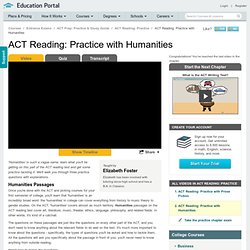
On the ACT, 'humanities' covers almost as much territory. Humanities passages on the ACT reading test cover art, literature, music, theater, ethics, language, philosophy, and related fields. In other words, it's kind of a catchall. The questions on these passages are just like the questions on every other part of the ACT, and you don't need to know anything about the relevant fields to do well on the test.
Here's how to tackle the questions: Read the question but not the answer choices. It's a simple strategy, but it does take some practice. Question 1 When we study a country's literature, we open up the book to read its soul. Sample Reading Questions: Passage 5. Click on the letter choices to determine if you have the correct answer and for question explanations.
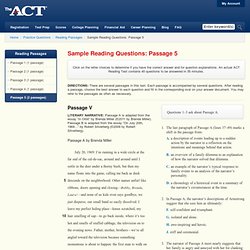
An actual ACT Reading Test contains 40 questions to be answered in 35 minutes. DIRECTIONS: There are several passages in this test. Each passage is accompanied by several questions. After reading a passage, choose the best answer to each question and fill in the corresponding oval on your answer document. You may refer to the passages as often as necessary.
Main Idea & Detail. ACT Reading: Author's Tone and Method Questions Video - Lesson and Example. Tone & Method Tone matters!
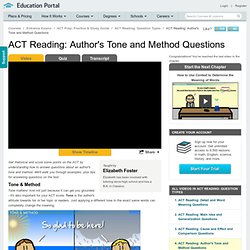
And not just because it can get you grounded - it's also important for your ACT score. Tone is the author's attitude towards his or her topic or readers. Just applying a different tone to the exact same words can completely change the meaning. If you imagine the way these two students would sound in your head, they'd be taking completely different tones. In other words, these two students are saying the same words to mean exactly opposite things - that's the power of tone. ACT Reading: Cause and Effect and Comparison Questions Video - Lesson and Example. Double Trouble ACT questions that cover just one part of a passage are bad enough.
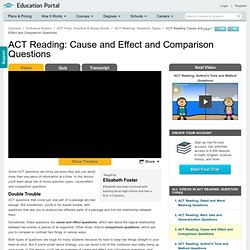
But sometimes, you're in for double trouble, with questions that ask you to analyze two different parts of a passage and find the relationship between them. Sometimes, these questions are cause and effect questions, which ask about the logical relationship between two events or pieces of an argument. Other times, they're comparison questions, which ask you to compare or contrast two things in various ways.
Both types of questions are tough for many students because it's hard to keep two things straight in your head at once. Cause and Effect In cause and effect questions, you'll need to identify not just facts but logical relationships between two parts of a passage. Here's an example: The low lighting and cobwebs gave the room a haunted, abandoned atmosphere. In this sentence, the author ascribes his nervousness primarily to... Not so bad, right? SAT vs. ACT - What's the Difference? Video - About.com.
ACT Reading - What is the Reading Section. ACT Reading - Author's Tone or Voice. ACT Reading - Vocab In Context. ACT Reading - Implications or Inferences. ACT Reading - Author's Purpose or Method. ACT Reading - Humanities Passages. Finding information in Arts and History - Finding information in Arts and History. This unit will help you to identify and use information in Arts and History, whether for your work, study or personal purposes.
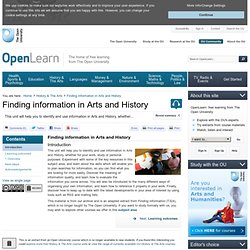
Experiment with some of the key resources in this subject area, and learn about the skills which will enable you to plan searches for information, so you can find what you are looking for more easily. Discover the meaning of information quality, and learn how to evaluate the information you come across. You will also be introduced to the many different ways of organising your own information, and learn how to reference it properly in your work. Finally, discover how to keep up to date with the latest developments in your area of interest by using tools such as RSS and mailing lists. This material is from our archive and is an adapted extract from Finding information (T324), which is no longer taught by The Open University. Finding information in science and nature - Finding information in science and nature. This unit will help you to identify and use information in Science and Nature, whether for your work, study or personal purposes.
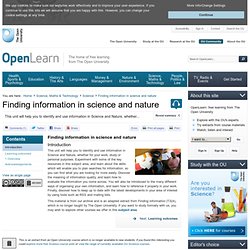
Experiment with some of the key resources in this subject area, and learn about the skills which will enable you to plan searches for information, so you can find what you are looking for more easily. Discover the meaning of information quality, and learn how to evaluate the information you come across. You will also be introduced to the many different ways of organising your own information, and learn how to reference it properly in your work.
Finally, discover how to keep up to date with the latest developments in your area of interest by using tools such as RSS and mailing lists. This material is from our archive and is an adapted extract from Finding information (T324), which is no longer taught by The Open University.